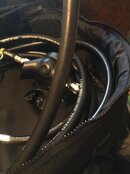scubadude223
Contributor
- Messages
- 143
- Reaction score
- 7
Hi,
Thanks for the help ahead of time.
Today when I was diving I was checking my First and Second Stage Regulator Setup for leaks. I did this by Pressure filling all of this hoses and then turning off the Tank Valve. I noticed that there is a very minor drop, every minute or so it drops by 100 PSI or so.
Because of this I decided to look into why this is happening. I was looking at the hoses and noticed small bubbles on the hose. This is most likely the cause of the pressure drop.
I am very concerned about two things. Have I compromised the internal parts of the first stage due to water entering where the bubbles are coming out. I realise under pressure water cant enter due to the gas pressure exerting on it, but is there a risk that after taking the pressure off of the hoses that water may enter, such as during cleaning. Similar to what happens if you depress the purge button.
I am also concerned that having a leak on the hose is something that I will always have to deal with. Is this a common thing for divers to have, and if so, is it something that I should just ignore.
Also is there a concern that there may be a critical failure with the hose when I am underwater
I have attached a picture of the hose and where the issue is.
Thanks so much for the help
Thanks for the help ahead of time.
Today when I was diving I was checking my First and Second Stage Regulator Setup for leaks. I did this by Pressure filling all of this hoses and then turning off the Tank Valve. I noticed that there is a very minor drop, every minute or so it drops by 100 PSI or so.
Because of this I decided to look into why this is happening. I was looking at the hoses and noticed small bubbles on the hose. This is most likely the cause of the pressure drop.
I am very concerned about two things. Have I compromised the internal parts of the first stage due to water entering where the bubbles are coming out. I realise under pressure water cant enter due to the gas pressure exerting on it, but is there a risk that after taking the pressure off of the hoses that water may enter, such as during cleaning. Similar to what happens if you depress the purge button.
I am also concerned that having a leak on the hose is something that I will always have to deal with. Is this a common thing for divers to have, and if so, is it something that I should just ignore.
Also is there a concern that there may be a critical failure with the hose when I am underwater
I have attached a picture of the hose and where the issue is.
Thanks so much for the help




